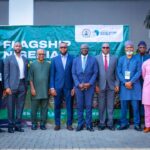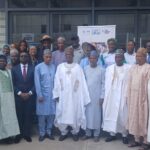By Abigael Joshua
The Federal Ministry of Environment has restated its commitment to deal decisively with plastic pollution in order to have a cleaner, greener and more resilient environment.
Malam Balarabe Lawal, Minister of Environment, said this on Tuesday in Abuja at an event to commemorate the 2025 World Environment Day, usually marked annually on June 5.
He said that the government had evolved a strategic framework – the National Policy on Plastic Waste Management – to reduce plastic use, promoting recycling, and encouraging innovation in alternatives to single-use plastics.
“As we celebrate World Environment Day, I would like to assure you that the Federal Government of Nigeria, under the leadership of President Bola Tinubu, is committed to a cleaner, greener, and more resilient environment.
“In line with the Renewed Hope Agenda, we are taking decisive steps to address plastic pollution at all levels.
“The theme, “Ending Plastic Pollution,” resonates with a global urgency that cannot be overstated.
“Plastic pollution is not just an environmental issue but also an economic and public health crisis,” Lawal said.
According to him, the ministry has also inaugurated the Extended Producer Responsibility (EPR) Programme, which mandates producers to take responsibility for the entire lifecycle of their plastic products, from production to disposal.
“The ministry is collaborating with key stakeholders across government, industry, and civil society to ensure that environmental policies translate into meaningful impact. However, we cannot do this alone.
“The fight against plastic pollution and other environmental challenges must be a people-oriented movement.
“This is a fight for the preservation of our ecosystems, the future of our children, and the survival of our dear planet,” he said.
Lawal said that Nigeria like many other nations, faces significant challenges in managing plastic waste.
“Our cities and rural communities suffer from the burden of unchecked plastic pollution ranging from sachet water bags littering our streets to microplastics entering our food chain and causing public health concerns.
“Every minute, plastic waste is being dumped into our oceans, rivers, and drainage systems, endangering wildlife and contributing to flooding in our urban centres.
“We are also supporting innovative circular economy models to drive recycling and promote plastic alternatives, especially across government ministries, departments, and agencies,” the minister assured.
Also, Massandje Toure-Litse, Commissioner, Economic Affairs and Agriculture, ECOWAS Commission, reaffirmed the body’s commitment to a clean, resilient and sustainable environment for future generations.
“Don’t put light plastic in microwave. Plastic is manufactured from oil and plastic contains hydrocarbon.
“When you put light plastic in microwave, this is the driver for cancer.
“The theme of this year: “Together we can beat plastic pollution” resonates deeply with our regional priorities.
“Plastic pollution is not only a global menace concern, but a regional and national crisis,” Toure-Litse said.
According to him, a World Bank report indicates that the region generates nearly eight million metric tonnes of plastic waste every year.
“A figure that is set to rise by 52 per cent in five years time.
“In addition, more than 80 per cent of plastic waste is poorly managed in West Africa, adversely affecting human, animal health, ecosystem and blue economy sector such as fishing and tourism.
“The cost of damage of one tonne of plastic pollution is about 10,000 to 33,000 US dollars.
“There is a growing recognition that plastic pollution is a transboundary problem that requires a coordinated regional response.
“So in this regard, ECOWAS is committed to addressing persistent challenge by adopting a regional regulation,” he said.
The commissioner said that across the region, Ghana and Nigeria were scaling up the Circular Economy Initiative, adding that the ECOWAS Commission would harmonise environmental standards and promote green industrialisation.
Mrs Alero Balogun, Senior Vice President, Corporate Services, Oando Clean Energy Ltd, urged stakeholders to support a better environment and climate change.
“Let this be the beginning or the continuation of a movement, one that puts people at the centre of plastic, in the right place and purpose behind every partnership,” Balogun said.
Similarly, Mrs Habiba Abubakar, Managing Director, ZoomLion Nigeria, expressed determination to partner with the ministry of environment in ending plastic pollution in Nigeria and to also turn plastic to wealth. (NAN)(www.nannews.ng)
Edited by Bayo Sekoni












